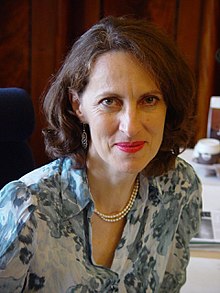Jacqueline McGlade
| Jacqueline McGlade | |
|---|---|
 |
|
| Born | May 30, 1955 |
| Nationality | British-Canadian |
| Fields | Science Policy, Environmental informatics, Marine science, Theoretical ecology, Ichthyology |
| Institutions | UNEP, European Environment Agency, University College London, University of Warwick |
| Alma mater | University of Cambridge, University of Guelph, University College of North Wales |
| Thesis | Genotypic and phenotypic variation in the brook trout, Salvelinus fontinalis (Mitchell) (1980) |
| Notable awards | Global Citizen Award, Masaryk Gold Medal, Minerva Prize, Jubileum Award, Jessie Smith Noyes Foundation Award in Genetics |
Jacqueline Myriam McGlade (born May 30, 1955) is a British-born Canadian marine biologist and environmental informatics professor. Her research focusses on the spatial and nonlinear dynamics of ecosystems, climate change and scenario development.
She was Executive Director of the European Environment Agency from 2003-2013, where she was on leave from her post as Professor of Environmental Informatics at University College London.
In 2014 she became Chief Scientist and Director of the Division of Early Warning and Assessment of the United Nations Environment Programme based in Nairobi.
Professor McGlade completed her BSc in Marine Biology, Biochemistry and Soil Science at the University College of North Wales, UK, in 1977. She obtained her PhD degree in 1980 on aquatic sciences and zoology from the University of Guelph in Canada. In 1987, she obtained a MA degree from the University of Cambridge in the UK.
McGlade’s PhD research on the mathematical and statistical analysis of the phenotypic and genotypic variability showed the critical importance of spatial dynamics in determining evolutionary divergence and ecological sustainability in freshwater and marine fish populations. This work led to her establishing the first population dynamics and genetics laboratory and developing spatial Lotka-Volterra models, ecological networks and artificial intelligence to apply earth observations in biological oceanography, fisheries and fleet deployment in Fisheries and Oceans Canada at the Bedford Institute of Oceanography, with NOAA (National Oceanic and Atmospheric Administration in the USA) and the intelligence systems laboratory at Xerox PARC. From 1987-1990, Professor McGlade continued her research in systematics, ichthyology, population dynamics and coastal issues in Cambridge as the Adrian Fellow at Darwin College, at the International Federation of Institutes of Advanced Study in the Netherlands, and Cranfield Institute in the UK.
...
Wikipedia
